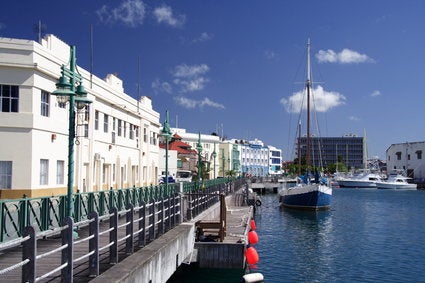By Christiaan Gischler* and Alice Driver**
The Caribbean Hotel Energy Efficiency Action Program (CHENACT) helps hotels embrace renewable energy and energy efficiency.

Around 25 million tourists visit the Caribbean each year, making tourism a key driver of the economy that accounts for 30 to 50% of direct and indirect employment in some countries. In most families, at least one member is employed in the hotel or tourism industry. Traditionally, hoteliers focused on expanding the number of available rooms in order to increase profits, but the 2008-2012 international economic crisis sparked a decline of up to 15% in tourist visitors.
That has forced hoteliers to find smart ways to reduce costs while maintaining the high quality of tourism services. Where to start? Perhaps with the sun, the air conditioning, and the light switch.
The Caribbean reports some of the world’s highest electricity rates, with customers paying more than US$ 0.40 per kilowatt/hour compared to US$ 0.10 per kilowatt hour in North America. Thanks to the Caribbean Hotel Energy Efficiency Action Program (CHENACT), Caribbean hotel owners have discovered that focusing on energy efficiency can produce substantial financial savings that help preserve jobs while also benefitting the environment.
Developed by the IDB in partnership with the Government of Barbados and other regional tourism associations (Caribbean Hotel & Tourism Association (CHTA)/ Caribbean Alliance for Sustainable Tourism (CAST), Caribbean Tourism Organization (CTO)), the United Nations Environmental Program (UNEP), the European Union’s Center for Development Enterprise (CDE)), and the local governments, CHENACT is an energy and climate change project that helps hotels assess their needs and invest in energy efficiency measures. This is accomplished through energy audits for hotels, which can lead to bankable projects supported through innovative financial mechanisms.
Since 2010, the CHENACT program has supported energy audits in 62 hotels and a pilot solar energy hotel demonstration that provided information about specifications, selection criteria, and other important issues to take into consideration when installing photovoltaic panels. According to Loreto Duffy-Mayers, CHENACT’s regional program manager in Barbados, the energy-efficiency and renewable energy measures “are making the hotels more competitive, so income is generated through cost savings which can be spent on improving the quality of the hotel.” That’s of vital importance for Barbados, which “is probably the most heavily dependent on tourism in the world,” she says.
Hotels in the Caribbean have discovered that something as simple as choosing energy efficient light bulbs can dramatically lower energy costs. For example, incandescent light bulbs cost around US$1.50 and last 1,200 hours. Although LED light bulbs require a greater initial investment of US$7, they last 50,000 hours, which produces significant savings, making hotels become more competitive over the long-term. “Looking at energy efficiency and renewable energy as an investment is certainly an innovative concept,” says Duffy-Mayers.
To complement CHENACT, the Government of Barbados, with IDB support, developed the Energy Smart Fund, a financial instrument that allows Small and Medium Enterprises (SMEs), including hotels, to apply for affordable loans at discounted rates to implement renewable energy and energy efficiency projects. Together, these initiatives have opened a new market in Barbados for renewable energy products and energy-efficiency applications. SMEs can sell any excess electricity back to the utility company, paying off their investment in as little as four years.
A number of hotels already have reaped the benefits of the CHENACT program. The Barbados Beach Club underwent an audit, transformed it into a bankable project, and then obtained financing from the Smart Fund. Today, the hotel boasts 60kW of solar panels and has retrofitted lights, air conditioners, television sets and pool pumps. The Old Seasons Europa Hotel installed 7.5kW of solar panels, which has cut the monthly energy bill by more than 10%.
On average, hotels that participate in the CHENACT program and implement its recommendations need to invest between $200,000 and $500,000, depending on the size of the hotel, but they can recover that investment in just 2-1/2 years. Beneficiary hotels are expected to reduce electricity consumption by 20 to 30%, yielding net savings of $280,000 over a seven-year period for small hotels and $975,000 for large hotels.
Thanks to the promising results in Barbados, the CHENACT program has been expanded to include hotels in Jamaica and the Bahamas, and there is demonstrable interest in several other Caribbean tourism markets.
For the 2,270 hotels across the Caribbean, annual electricity consumption totals 4.36 GWh, and energy efficiency measures have the potential to cut energy use by nearly one fourth while reducing CO2 emissions by around 885,000 tons per year. By making hotels more profitable, the program has the potential to help preserve jobs and even create new opportunities in the region’s vital tourism industry.
_____________
This post is part of a blog series on development effectiveness featuring stories on learning and experiences from IDB projects and evaluations. To learn more about design, monitoring and evaluation of IDB projects visit deo.iadb.org.
*Christian Gischler is an Energy Senior Specialist at the Inter-American Development Bank
** Alice Driver in charge of communications at the IDB Energy Division and she works with the Sustainable Energy for All Americas initiative. Driver completed a postdoctoral fellowship at the Universidad Nacional Autónoma de México (UNAM) in 2013 where she worked with the Centro de Investigaciones sobre América del Norte.


Leave a Reply